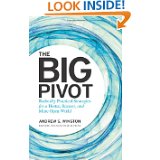Here’s Part 4 of my summary of “The Big Pivot,” Andrew Winston’s latest book. The book is 352 pages, so I offer these posts as a shortcut to understanding the gist of it.
We’ve covered the mega-challenges, the Vision Pivot and the Valuation Pivot. The third and final pivot is the “Partner Pivot.” It’s all about collaborating – with government, with competitors and with customers.
A Super-Condensed Summary: The Partner Pivot
Because it will take all of us working together to transition to a cleaner, greener economy, businesses need to find new ways to influence stakeholders. Winston suggests:
Become a Lobbyist
According to Winston, “Political action and lobbying are absolutely critical to making the Big Pivot successfully.”
He identifies 5 key policies that companies should lobby for:
- Put a Price on Carbon – Winston recommends a carbon tax as a “great revenue and deficit-reduction opportunity.”
- End Fossil-Fuel Subsidies – and subsidize cleaner energy for a while. We have a short time to eliminate carbon. Subsidies that speed the shift from fossil fuels to clean energy – and then decline – make sense.
- Pursue Public-Private Investment in the Clean Economy – “The private sector alone cannot build the infrastructure we need for a modern, clean economy.” Government’s track record of success with long-term public-private investment programs includes the birth of the computer age, the federal highway system, the fight against AIDS, and the space program.
- Implement Higher “Clean” Product and Production Standards – if your product uses less energy than your competitors, why not lobby for a higher standard for all? It will level the playing field, and put your competitors in a tough spot.
- Support Greater Corporate Transparency – Big business spent millions in California and Washington State to defeat proposed laws requiring labels for GMO foods. Says Winston, “companies that were against the law…were on the wrong side of history.”
According to Winston, “Business needs to treat government – which is the representation of our collective wills – as a partner, not an enemy.”
Collaborate Radically
“The mega-challenges are exactly that – mega – we cannot solve them alone – we have to collaborate.”
One such collaborative effort going on right now is The Sustainability Consortium. Established with funding from Walmart, the group is composed of 80 of the world’s largest retailers, including Coke, Clorox, Colgate-Palmolive, P&G, Pepsi and Unilever.
TSC’s purpose is to reduce the impacts of global consumption by gathering much better data on the life cycle impacts of consumer products. Using TSC’s footprint data, retailers can better decide what goes on the shelves.
It’s a big change for businesses used to thinking only of “cutthroat competition.” But Winston encourages companies to map the “ecosystem” of their industry, identify “hot spots” where joint action can have the biggest impact, and lay out a migration path to lower-carbon solutions.
Inspire Customers to Care and to Use Less
This is a tough one. We live in a “consumer” society, and that mentality is hard to break.
But according to Winston, “The mega-challenges we face can’t be handled by government or business alone…We need citizens as consumers to make different choices.”
Why? Because their impacts may be far greater than those of business. When Unilever measured the impacts (energy, water, waste) of its major products, it found that its own manufacturing footprint was a small fraction of the total. Consumers were responsible for the lion’s share. “The water we use to shampoo our hair, and the energy we use to heat the water, dwarfs the resources needed to make the product.”
In an ideal world, “a circular economy filled with smartly designed products can help solve some of our resource challenges, but that’s a long way off.”
In the meantime, businesses are trying different approaches. Patagonia had its “Don’t Buy This Jacket” campaign. The message is not just “use less” but “get more value and live better.”
Marks and Spencer, the British retailer, has its “Shwop Your Old Clothes” campaign. It encourages customers to bring their old clothes back to the store. M&S makes a “Shwop” coat from recycled items that is half the cost of a virgin wool coat.
According to Winston, “when companies say they can’t sell greener products because customers don’t want them, it’s a cop out.” Companies create “needs” all the time. If Marketing focuses on educating consumers about how to make better choices, those messages will motivate action over time.
How is your business partnering around the mega-challenges?


Leave a Reply